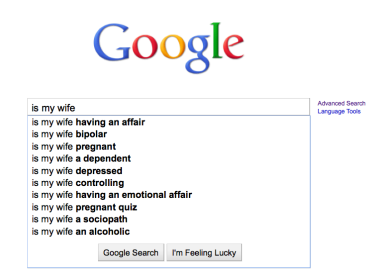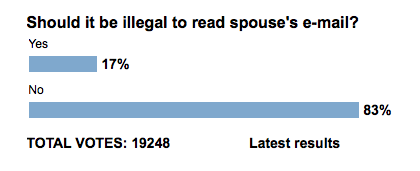 I want you to close your eyes and imagine a world where it’s illegal for your girlfriend or your roommate or your ex or your wife or your boyfriend to read your email. Not just unethical, not just against the rules of Lesbian Fight Club, but actually illegal. As in, you could spend up to five years in prison for doing so.
I want you to close your eyes and imagine a world where it’s illegal for your girlfriend or your roommate or your ex or your wife or your boyfriend to read your email. Not just unethical, not just against the rules of Lesbian Fight Club, but actually illegal. As in, you could spend up to five years in prison for doing so.
Are you panicking because you don’t know how you’ll maintain your Big Brother-esque control over your significant other’s whereabouts without regularly violating her privacy? Or do you feel excited because now your significant other can no longer impose her Big Brother-esque control over your whereabouts – or at least has to find a way to maintain such control without regularly violating your privacy?
Well, in Rochester Hills, Michigan, Leon Walker is being charged with a felony after reading his now-ex-wife Clara Walker’s Gmail account on the laptop they shared. Leon, Clara’s third husband, learned via email-spying that Clara was having an affair with her second husband.
Oakland County prosecutors are using a state statute generally only used to prosecute crimes like stealing trade secrets or identity theft, so this case is a bit of an oddity, and could possibly become a really big deal.
In conversation with The Free Press, Frederick Lane (“a Vermont attorney and nationally recognized expert who has published five books on electronic privacy”) said that 45% of divorce cases involve some kind of snooping but generally these things come up in civil court, not criminal court. Lane says that the couple’s co-habitation and Leon’s alleged regular use of the computer could work in his favor.
Was Leon actually snooping through email because he was looking out for the welfare of the child? Or because he suspected his wife was cheating on him? Does it matter?:
Oakland County prosecutor Jessica Cooper, in a voice mail to the newspaper, calls Walker a skilled “hacker” who used his wife’s e-mail “in a contentious way.”
In preliminary testimony, Clara testified that while Leon had bought her that laptop, it was hers alone and that she kept the password a secret.
Leon Walker says he routinely used the computer and that she kept all of her passwords in a small book next to it. “It was a family computer,” he says. “I did work on it all the time.”
The thing is — this sounds like a pretty special and unique situation and it’s kinda unfortunate that this will be the first time something like this enters the courtroom. If your child is literally in danger, I think checking your wife’s Gmail is probably the responsible thing to do.
This is the sentence where I use this story about these people to launch into a broader discussion about e-mail privacy, etc. READY LET’S GO!

Prosecuting the act of snooping in your wife’s email when the government is likely tracking our every move and Google has implanted mind-control chips in our fingers and the Patriot Act EXISTS seems a bit out of line. Listen I’m basically a s*c***ist but that kind of legislation seems just a tad too invasive. This is the kind of thing people should work out on their own, it’s not really a government issue.
However, I admire the spirit of this case! BECAUSE SNOOPING IN SOMEONE’S EMAIL IS FUCKING STUPID.
Email snooping is tricky business and in my opinion, it’s very rarely okay.
Nobody’s relationship with anyone should be taken out of context, and you never know how your girlfriend might communicate differently with different people.
For example!
A friend of mine I’ll call “Mackenzie” (because I just watched this video on Jezebel of the 4o-year-old trapped in a toddler’s body) regularly sent me panicked emails regarding her various neurotic paranoias, such as “Will I get stuck on the A train tomorrow?” or “Am I too dumb for my own job?” “Is [x] a bad friend?” “Will we never have sex again?” or “What if she’s just not my type and I’m not into her anymore?”
When two lines after asking, “What if she’s just not my type and I’m not into her anymore?” she asks about the likelihood of her impending date with death via meningitis, it’s pretty clear that these questions aren’t meant to be taken seriously, let alone used as the basis for a major blowout and relationship-reckoning session. But if you were Mackenzie’s girlfriend, you might never be able to shake the feeling you felt when you read “what if she’s just not my type?” which is why, Mackenzie’s girlfriend, you should never read Mackenzie’s email.
What if there is an affair, however? What if, for example, you’ve gifted your on-again-off-again boyfriend a Mac laptop and, when said laptop breaks, you (kindly) offer to try and fix it and in lieu of success, pay for someone else to fix it (also he may or may not STILL owe you $300 from a vacation you took in 2003) and while the laptop is in your possession and you are investigating its brokenness in order to PAY for it to get FIXED, you happen upon a folder named after a girl whose picture, suspiciously, was on the nightstand you’d stare at forlornly after having sex with him again even though you’d promised your soul NEVER AGAIN? What if this folder contained love letters between the boy and Nightstand Girl during the period in which he said she was “just a friend”/”like a sister”? Would it then be ethical to drive to his house and throw the laptop at his face? I think so. In that case, I feel, it is appropriate to break the laws of Bisexual Fight Club. IMHO.
Recently, I had this conversation, which I think is the way all these conversations should go:
Person #1: (looking over my shoulder at the computer) Why does [person] [verb] [action]?
Me: Why are you reading my G-Chat?
Because — in my opinion, that’s all that needs to be said. I’ve had to leave work mid-afternoon to deal with a snooping roommate/sexual partner/co-worker/best friend (yes I know, bad idea, you never want all those things to be the same person).
Of course, those scenarios — and I’m sure you all have horror stories of your own (PLEASE SHARE!) — pale in comparison to what Leon Walker was considering when he checked Clara’s email.
Polls on The Free Press website and the USA Today indicate most agree that snooping isn’t okay, but that it shouldn’t be criminalized either:

…and it’s unclear where this fits in with statues like the Electronic Communications Act, which as the name implies protects private electronic communications from being accessed without a warrant. Though it’s widely believed that opening someone else’s postal mail is against the law, that’s not the case precisely:
In the United States there is no specific constitutional guarantee on the privacy of correspondence. The secrecy of letters and correspondence is derived through litigation from the Fourth Amendment to the United States Constitution. In an 1877 case the U.S. Supreme Court stated:
No law of Congress can place in the hands of officials connected with the Postal Service any authority to invade the secrecy of letters and such sealed packages in the mail; and all regulations adopted as to mail matter of this kind must be in subordination to the great principle embodied in the fourth amendment of the Constitution.[1]
We have long regulated the right of the government to go snooping around. No reading mail, J. Edgar Hoover. No reading email, Robert Mueller. (Sort of…hello Patriot Act). But with new advents in technology that enable toddlers to be proficient at computer use before they fully develop fine motor skills, we must consider how digital snooping should be regulated on a citizen’s level. Or maybe not. What do you think?








Comments
On principle: reading girlfriend’s email = bad, but probably not illegal
In reality (see “dysfunctional relationship”): reading girlfriend’s email = overwhelmingly tempting
I think if you are in a trusting relationship, and communicate well with your girlfriend, then snooping seems unnecessary. If the relationship is going downhill, then snooping becomes more tempting when you’re searching for explanations.
um amazing photo.
i saw it and began to LOL, then wondered if i’m not sober.
Checking her email = bad idea. Yes. But the prosecution is stupid. There’s an old law that isn’t enforced, but should be in this case because it’s such a waste of the court’s time, that it is illegal to have an affair in the state of Michigan. Yes, illegal. And if he chose to get revenge, he could press charges on that alone.
Text of the law:
“Any person who shall commit adultery shall be guilty of a felony; and when the crime is committed between a married woman and a man who is unmarried, the man shall be guilty of adultery, and liable to the same punishment.”
BEST EVER
My gf actually has me check her email for her. It’s more like a chore than anything.
I think what’s worse than snooping is someone making you feel like you have to snoop. Fuck, I mean, just break up if you’re going to cheat. Just break up if you’re going to sneak around or be dishonest even if you’re not cheating.
I feel like the people who think it should be illegal probably have something to hide. Maybe.
“I feel like the people who think it should be illegal probably have something to hide. Maybe.”
Yes. It’s like the people who say, “I’m so glad they made texting while driving illegal! I was the worst offender!”
UGH. Then stop doing it! Why does the law have to babysit you?
Nice trust we have in each other… hiring lawyers to sort out problems, instead of dealing with them as adults.
Generally, I don’t support further criminalization of activities. We have too many laws and too many punishments. But I’m inclined to make an exception here. (Feel free to convince me otherwise).
Here’s the thing: the law prohibits against unauthorized access of your email/online accounts. Yes, that includes significant others and spouses. But more generally it includes the world. I’m okay with making it a crime for someone to break into my online accounts.
I understand why this seems like overkill. But the same law that would prohibit your girlfriend from accessing your email without permission would also prohibit your neighbor/cousin/stalker from sneaking past your security questions (which are far too easy to know, for those who know you well) or using information offered for one purpose for another (say, using a netflix password to get into an email account). The distinction shouldn’t be based on relationship – it should be based on authorization.
My digital space is an extension of my physical space; no one questions that it would be a crime for someone to break into my apartment and start searching through my records. Why should this be different, just because these records are stored on the internet or on my computer?
I totally agree with you on all points. But I also have privacy issues (I don’t even like when my parents talk about to me other people (like their co-workers or extended family), because it should be my decision whether or not those other people are privy to the information about me).
agreed. I don’t actually think about the COULD THEY BE CHEATING aspect as much as I think about friends who have confided in me through email or text that they think they’re in an abusive relationship, only to discover that their girlf/boyf snooped and everything got really really bad.
Like, yeah, some people have something to hide. Sometimes it’s for a really good reason.
I completely agree, I see it as like assault laws/whatever. Technically, it is not legal for me to punch my brother in the arm, violence, etc. In practise, the idea is so ridiculous that anyone would waste anyone’s time by taking it to court, it would never happen. On the other hand, if I was constantly punching my brother in the arm, being abusive, etc, it becomes a problem that has to be addressed. There are plenty of things for which people in law-related professions need to exercise discretion, I think this should be one of them. What’s the legal distinction between my girlfriend and my best friend, my mum, my co-worker, a stranger on the street? And just because I only use my email to send funny youtube links to my best friend doesn’t mean that’s all that’s in anyone’s email/
I don’t have a girlfriend or any sexy secret messages. Would it be weird if I got that last picture of snooping lady tattooed somewhere on my lower back?
I’m sad to say I did snoop once. I’m sadder to say that she was cheating, I took her back, and then she left me for someone entirely different 9 months later. :(
hopefully i have better communication skills before the next girlfriend :)
I have difficulties not looking at people’s screens when they are right in front of my face. I try not to snoop, I really do, but some things are hard not to see.
hugs for jenin. also, LOVE that photo. it looks like she’s threatening to tickle the computer.
aww..thanks <3
ive done this before – took a “peek” at my then bf’s email – and i found some interesting stuff like he was still talking to his exES and made some crazy promises to THEM. fml
See, at that point i was glad that i did it cause otherwise i wouldve been fooled and still believed that he was the one. However, i realized that if i had to take the extra step to snoop in his email, it meant that i just didnt trust this person completely (which is bad for a relationship anyway).
Since then, i promise myself that i will never to do this again and if i ever feel the need to do it, it means that the person is just not worth it. (keeping my promise)
So i guess i agree with most of the previous commenters here that checking email = bad but prosecution = too much
I sent some incredibly revealing photos of myself to my girlfriend at the time and her ex got into her email and that was TERRIBLE. I def think it’s morally wrong but I don’t think someone should go to prison for it. If they are exploiting the information they see then that’s another thing, idk. It was a good lesson in not sending naked pics via email. And their break-up had been pretty recent so was really dumb of me to get up on that so soon after. Another lesson learned.
An ex broke her phone and so borrowed her mum’s for a couple of days. She went snooping and saw nude pics of her dad and bizarre sexting.
That aside I think it’s morally wrong but also it’s just you’ll quite often see stuff you will regret.
i was outed by a: someone going through my wallet and b: someone going through my texts. see, i was dumb enough to have enough faith that i could lay my stuff lying around and not think my family would look through it. also, my ex-gf once read an email my friend sent me after i came out to her, and it wasn’t anything bad, but it was personal and i was miffed to say the least. so i am anti snooping. buuuut i once also was EXTREMELY tempted to go through my (same) ex’s texts, but she did cheat on me four times so maybe i had reason? i don’t know, SNOOPING IS BAD KIDS. don’t do it because you feel dirty afterwards. also, it does seem a little excessive of the government to punish someone for email snooping. its great in theory, but how the fuck would that work?
People still use emails in affairs?
lol nice. you are very very wise grasshopper.
this is a sort of different angle, but from the perspective of someone whose family has a tendency to snoop in emails, place key-tracing software on computers (they bought it, so technically they can do what they want), or track cell phones (same principle as the computer they’re paying the bill), I would just like to point out that being spied on feels shitty, and also that it’s even shittier when someone reveals/confronts you about information found while snooping (in my case, my overwhelming gayness). Like seriously? It sucks, and it’s kind of awkward/painful for everyone.
i find myself looking a little too long at the subject lines in my gfs email when i use her computer and it automatically signs her in (its left up on the screen all the time, and i practically live with her). especially when her exes email her…i especially had a lot of angst when she left for a week over the holidays and i stayed in her apartment…all of her secrets just sitting in her inbox. but i feel like that impulse is fundamentally different from a hacker or something like that. i want to look at her inbox because i love her and have a (however immoral) curiosity about everything about her. some asshole hacker who wants her credit card info is a little different. but i totally see jessica’s point about the law needing to be the same across the board to unsure privacy and protection under the law.
I do think it’s unfortunate that the ex husband is being prosecuted in the above case, as I agree that it seems like more of a private/civil matter, but of course my opinion on their situation is based only on the details that have been made public and therefore relatively uninformed. So who really knows.
All of that aside, this is a super interesting topic.
Online platforms for all types of communication will only become more dominant than they already are as time passes (ugh, which I am reminded of every fucking mercury retrograde when everything becomes a disaster), and I do agree that accessing someone’s online accounts is as equal a privacy violation as reading their snail mail, going through their drawers, etc. IF NOT MORE SO because of how much we use online communication for our most personal matters over snail mail etc.
Plus it’s just rude and disrespectful. Respect is primary in pretty much every relationship, if you throw that out I’d say you’re fucked from there on out. I cannot imagine wanting to continue to be with someone if I don’t respect them enough as a person to stay out of their email or if they don’t respect me enough to stay out of mine.
I know at least both gmail and facebook have make it possible to check IP address history etc.(facebook even gives an approximate location and the web browser of your most recent activity through account settings), which I think is cool because it makes “spying” less anonymous. If you’re going to snoop, whatever your reasons are, you should at least be honest about it afterwards, right? Right.
Super fucking interesting stuff for real.
Don’t worry, everyone. Soon, reading in general will be illegal, and we will live in a convenient world where info is served up to us. I cannot wait.
I think we should have the law. If it happens and it’s a significant other, I don’t think I would press charges. But I would like to be able to if I have to with “others”.